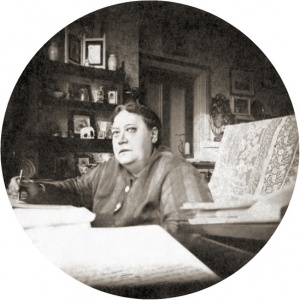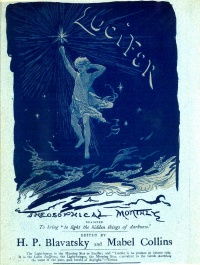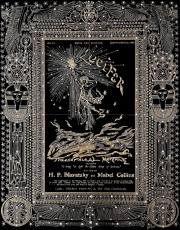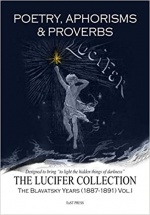Lucifer (periodical)

- NOTE: For the Biblical character sometimes identified as Satan, see Lucifer.
Several periodicals have been published using the name Lucifer. The earliest, published by H. P. Blavatsky, is the one described in this article.
- Another Lucifer was published by the Theosophical Club at Point Loma during the 1930s.[2]
- In 1979 the Dutch Section of the Theosophical Society Point Loma began publishing a Dutch Lucifer, and in February 2013 its publishers added an English-language edition called Lucifer: the Messenger of Light that is distributed over the Internet.
Blavatsky's Lucifer
Lucifer was a monthly journal published from September, 1887, to August, 1897, in London. The first issue was published on September 15, 1887. The names of H. P. Blavatsky and Mabel Collins appear as Editors, with the publisher as George Redway, York Street, Covent Garden, London. Bertram Keightley assisted the editors. The slogan printed on the cover was "To bring to light the hidden things of darkness." Mme. Blavatsky edited it until her death in 1891, followed by Annie Besant. After September 1895 G. R. S. Mead joined the editorial staff.
Besides Mme. Blavatsky and Mabel Collins, other major contributors included Archibald Keightley, Anna Bonus Kingsford, H. S. Olcott, William Scott-Elliot, Constance Wachtmeister, Gerald Massey, William Kingsland and many others. The co-editors contributed substantially, although HPB was usually anonymous in her writings.
A new volume of the journal was started every six months, rather than annually, so that the volumes ran September-February and March-August.
During the years when Blavatsky served as editor, the magazine was organized in this sequence
- Editorials
- Correspondence, with HPB responding to any question
- Poetry, parables, and aphorisms
- Articles
- Fiction and satire, including horror and ghost stories
- Literature review – mystic, occult, philosophical, fiction, science, etc.
- "From the Pages of an Unpopular Philosopher" (a regular feature for seven months)
- Financial reports
- Work of the Theosophical Society, its lodges and publications
- "Going To and Fro"
After her death, the magazine placed more emphasis on scholarly articles, and greatly reduced departments such as poetry and fiction.
Reason for the name
The first issue of the magazine had an article entitled: "What's in a Name? Why the Magazine is Called 'Lucifer'", in which H. P. Blavatsky explained:
The name of the present magazine--rather equivocal to orthodox Christian ears--is due to no careless selection, but arose in consequence of much thinking over its fitness, and was adopted as the best symbol to express that object and the results in view.
Now, the first and most important, if not the sole object of the magazine, is expressed in the line from the 1st Epistle to the Corinthians, on its title page. It is to bring light to "the hidden things of darkness," (iv. 5); to show in their true aspect and their original real meaning things and names, men and their doings and customs; it is finally to fight prejudice, hypocrisy and shams in every nation, in every class of Society, as in every department of life. The task is a laborious one but it is neither impracticable nor useless, if even as an experiment.
Thus, for an attempt of such nature, no better title could ever be found than the one chosen. "Lucifer," is the pale morning-star, the precursor of the full blaze of the noon-day sun. . .[3]
Mme. Blavatsky recognizes that "piously inclined readers may argue that 'Lucifer' is accepted by all the churches as one of the many names of the Devil",[4] but argued that this was due to a misconception:
Deeply rooted, indeed, is this preconception and aversion to the name of Lucifer—meaning no worse than “light-bringer” (from lux, lucis, “light,” and ferre, “to bring”). . . . So absurd and ridiculous is that prejudice, indeed, that no one has seemed to ever ask himself the question, how came Satan to be called a light-bringer.[5]
Although she anticipated that "by adopting it for the title of their magazine the editors have the prospect of a long strife with public prejudice before them", she was willing to face the consequences, adding that "if one would fight prejudice, and brush off the ugly cobwebs of superstition and materialism alike from the noblest ideals of our forefathers, one has to prepare for opposition".[6]
Reactions to the name
At the end of the article "What's in a Name? Why the Magazine is called Lucifer" Mme. Blavatsky wrote about a few of the reactions she encountered before the publication of the first issue:
Hardly had the title been agreed upon, when the first premonitions of what was in store for us, in the matter of the opposition to be encountered owing to the title chosen, appeared on our horizon. One of the editors received and recorded some spicy objections. The scenes that follow are sketches from nature.
I A Well-known Novelist. Tell me about your new magazine. What class do you propose to appeal to?
Editor. No class in particular: we intend to appeal to the public.
Novelist. I am very glad of that. For once I shall be one of the public, for I don't understand your subject in the least, and I want to. But you must remember that if your public is to understand you, it must necessarily be a very small one. People talk about occultism nowadays as they talk about many other things, without the least idea of what it means. We are so ignorant and--so prejudiced.
Editor. Exactly. That is what calls the new magazine into existence. We propose to educate you, and to tear the mask from every prejudice.
Novelist. That really is good news to me, for I want to be educated. What is your magazine to be called?
Editor. Lucifer.
Novelist. What! Are you going to educate us in vice? We know enough about that. Fallen angels are plentiful. You may find popularity, for soiled doves are in fashion just now, while the white-winged angels are voted a bore, because they are not so amusing. But I doubt your being able to teach us much.
II A Man of the World (in a careful undertone, for the scene is a dinner-party). I hear you are going to start a magazine, all about occultism. Do you know, I'm very glad. I don't say anything about such matters as a rule, but some queer things have happened in my life which can't be explained in any ordinary manner. I hope you will go in for explanations.
Editor. We shall try, certainly. My impression is, that when occultism is in any measure apprehended, its laws are accepted by everyone as the only intelligible explanation of life.
A M. W. Just so, I want to know all about it, for 'pon my honour, life's a mystery. There are plenty of other people as curious as myself. This is an age which is afflicted with the Yankee disease of "wanting to know." I'll get you lots of subscribers. What's the magazine called?
Editor. Lucifer--and (warned by former experience) don't misunderstand the name. It is typical of the divine spirit which sacrificed itself for humanity--it was Milton's doing that it ever became associated with the devil. We are sworn enemies to popular prejudices, and it is quite appropriate that we should attack such a prejudice as this--Lucifer, you know, is the Morning Star--the Lightbearer, . . . . . .
A M. W. (interrupting). Oh, I know all that--at least don't know, but I take it for granted you've got some good reason for taking such a title. But your first object is to have readers; you want the public to buy your magazine, I suppose. That's in the programme, isn't it?
Editor. Most decidedly.
A M. W. Well, listen to the advice of a man who knows his way about town. Don't mark your magazine with the wrong colour at starting. It's quite evident, when one stays an instant to think of its derivation and meaning, that Lucifer is an excellent word. But the public don't stay to think of derivations and meanings; and the first impression is the most important. Nobody will buy the magazine if you call it Lucifer.
III A Fashionable Lady Interested in Occultism. I want to hear some more about the new magazine, for I have interested a great many people in it, even with the little you have told me. But I find it difficult to express its actual purpose. What is it?
Editor. To try and give a little light to those that want it.
A F. L. Well, that's a simple way of putting it, and will be very useful to me. What is the magazine to be called?
Editor. Lucifer.
A F. L. (After a pause) You can't mean it.
Editor. Why not?
A F. L. The associations are so dreadful! What can be the object of calling it that? It sounds like some unfortunate sort of joke, made against it by its enemies.
Editor. Oh, but Lucifer, you know, means Light-bearer; it is typical of the Divine Spirit--
A F. L. Never mind all that--I want to do your magazine good and make it known, and you can't expect me to enter into explanations of that sort every time I mention the title? Impossible! Life is too short and too busy. Besides, it would produce such a bad effect; people would think me priggish, and then I couldn't talk at all, for I couldn't bear them to think that. Don't call it Lucifer please don't. Nobody knows what the word is typical of; what it means now is the devil, nothing more or less.
Editor. But then that is quite a mistake, and one of the first prejudices we propose to do battle with. Lucifer is the pale, pure herald of dawn--
Lady (interrupting). I thought you were going to do something more interesting and more important than to whitewash mythological characters. We shall all have to go to school again, or read up Dr. Smith's Classical Dictionary. And what is the use of it when it is done? I thought you were going to tell us things about our own lives and how to make them better. I suppose Milton wrote about Lucifer, didn't he?--but nobody reads Milton now. Do let us have a modern title with some human meaning in it.
IV A Journalist (thoughtfully, while rolling his cigarette). Yes, it is a good idea, this magazine of yours. We shall all laugh at it, as a matter of course: and we shall cut it up in the papers. But we shall all read it, because secretly everybody hungers after the mysterious. What are you going to call it?
Editor. Lucifer.
Journalist (striking a light). Why not The Fusee? Quite as good a title and not so pretentious.[7]
Index to the periodical
The Union Index of Theosophical Periodicals[1] provides a searchable index to this periodical online, listing article titles and authors in chronological sequence.
Availability online
- The International Association for Preservation of Spiritualist and Occult Periodicals offers searchable PDF files of the entire run of the periodical at IAPSOP website.
- The first ten volumes, the five years from September 1887 to August 1892, have been made available online by the Blavatsky Archives.
- The first eight volumes are available from Universaltheosophy.com.
- Volumes 1-8 (1887-1897)- high-quality PDFs available at UniversalTheosophy.com.
The Lucifer Collection
Members of the European School of Theosophy started a project in 2020 to reprint the full run of Lucifer, in order to preserve these writings and to make them accessible in a topical sequence. Juliet Bates and Erica Georgiades serve as editors. According to the project's website lucifer-collection.com:
The Lucifer Collection presents a re-print of the complete original Lucifer Journal contents and is divided into two parts: a. The Blavatsky Years, presenting all Lucifer Journal contents, during the years Blavatsky was the Editor; b. The Post-Blavatsky Years offering all contents of the Journal after Blavatsky passed away. The Lucifer Collection contains the full content of the original Lucifer Journal writings, divided into categories to facilitate research and provide people with specific topics of interest or study.
These are the volumes published by mid-2021:
- The Blavatsky Years (1887-1891)
- I – Poetry, Proverbs and Aphorisms
- II – The Last Song of the Swan
- III – The Blossom and the Fruit
- IV – The Talking Image of Urur
- V – Dreams, Visions & Tales of Wonder
- VI – Ghosts, Vampires, Fairies & Other Stories
- VII – Blavatsky’s Companion to Pistis Sophia
- VIII – What’s in a Book?
- The Post-Blavatsky Years (1891-1897)
Additional resources
Articles
- To the Readers of "Lucifer" by H. P. Blavatsky
- What's In A Name? by H. P. Blavatsky
- Lucifer: The History of a Cover by Joma Sipe
- Lucifer (PUB) in Theosophy World.
Notes
- ↑ This photo was taken by William Quan Judge using a Kodak camera in her home at No. 17 Lansdowne Road, London. The occasion was described in Volume 1 of Echoes from the Orient, Judge's collected writings on pages 259 and 262-263. Photo courtesy of Will Thackara at International Theosophical Society (Pasadena); restoration of photo by Pavel Malakhov.
- ↑ A sample from August 1933 is available in Box 1 of the Boris de Zirkoff Papers. Records Series 22. Theosophical Society in America Archives.
- ↑ Helena Petrovna Blavatsky, Collected Writings vol. VIII (Wheaton, IL: Theosophical Publishing House, 1990), 5.
- ↑ Helena Petrovna Blavatsky, Collected Writings vol. VIII (Wheaton, IL: Theosophical Publishing House, 1990), 6.
- ↑ Helena Petrovna Blavatsky, Collected Writings vol. VIII (Wheaton, IL: Theosophical Publishing House, 1990), 7.
- ↑ Helena Petrovna Blavatsky, Collected Writings vol. VIII (Wheaton, IL: Theosophical Publishing House, 1990), 7.
- ↑ Helena Petrovna Blavatsky, Collected Writings vol. VIII (Wheaton, IL: Theosophical Publishing House, 1990), 8-10. Note: A fusee is a wooden friction match.


